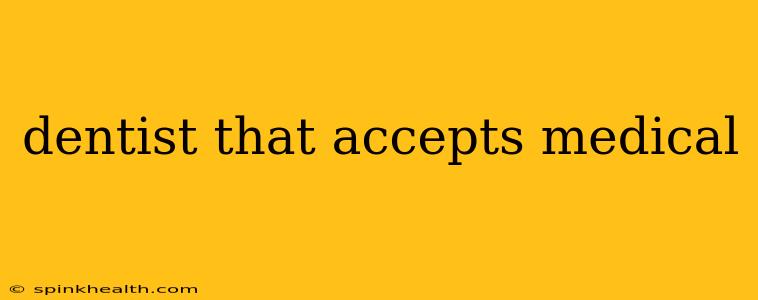Finding a dentist who accepts your medical insurance can feel like navigating a maze. It shouldn't be! Let's unravel this common dental dilemma and get you on the path to a healthy, happy smile. This journey started for me, surprisingly, with a chipped tooth and a mountain of paperwork. It's a story many share.
My own chipped tooth ordeal began innocently enough. A rogue pretzel, a slightly too-enthusiastic bite, and suddenly, there I was, staring at a damaged incisor. The panic wasn't just about the aesthetic – it was about the cost. Dental work is expensive! This led me down the rabbit hole of searching for dentists who accepted my medical insurance. And believe me, the process wasn't always straightforward.
What Does "Accepts Medical Insurance" Really Mean for Dental Care?
This is where many misunderstandings arise. Most medical insurance plans don't cover routine dental care like cleanings, fillings, or cosmetic procedures. They primarily focus on medically necessary dental treatments related to a diagnosed medical condition. This is a crucial distinction.
What Types of Dental Procedures Might Be Covered by Medical Insurance?
This is where the specifics of your policy come into play. You need to contact your insurance provider directly. Generally, medical insurance might cover dental procedures deemed medically necessary, such as:
- Treatment for injuries: Dental work resulting from accidents or trauma. (This is how my chipped tooth was eventually covered!)
- Extractions due to severe periodontal disease: When gum disease necessitates tooth removal.
- Oral surgeries related to medical conditions: Procedures connected to conditions like diabetes or temporomandibular joint (TMJ) disorder.
- Dental work for people with certain medical conditions: Treatment related to cleft palates or other congenital conditions.
How to Find a Dentist Who Accepts Medical Insurance
The quest for a dentist who works with your medical insurance requires a multi-pronged approach:
-
Contact Your Insurance Provider: This is the most critical step. Your insurance company can provide a list of dentists in your network who might accept medical coverage for specific dental procedures. Don't assume; always verify!
-
Use Online Search Tools: Websites and online directories allow you to filter your search by insurance acceptance. Be precise with your search terms; use phrases like "dentist accepting [your insurance name] for medically necessary procedures."
-
Check Dental Practices Directly: Call potential dentists' offices and inquire directly whether they accept your specific medical insurance plan and for what types of procedures. Be prepared to explain the reason for your dental needs.
-
Ask Your Doctor for Referrals: If your dental issue stems from a diagnosed medical condition, your physician may be able to recommend dentists experienced in handling such cases and who work with your insurance plan.
Does My Medical Insurance Cover Dental Implants?
Typically, no. Dental implants are usually considered cosmetic or elective procedures and are not covered by most medical insurance plans. However, there might be exceptions in cases of severe bone loss or other medically necessary situations. Always verify with your provider.
Does My Medical Insurance Cover Orthodontics?
Again, generally no. Orthodontic treatment (braces, Invisalign) is rarely covered by medical insurance unless it's directly linked to a diagnosed medical condition affecting jaw alignment or breathing. This often requires documentation from your physician or orthodontist detailing the medical necessity.
What if My Dentist Doesn't Accept My Medical Insurance?
Don't despair! Many dentists offer payment plans or work with financing companies to help make dental care more affordable. Explore options like CareCredit or other dental financing programs. Your dentist's office staff can often assist with these arrangements.
My journey to a repaired tooth involved persistence, patience, and several phone calls. But finding a dentist who worked with my medical insurance for a medically necessary procedure was ultimately successful. Remember, the key is to be proactive, thorough, and persistent in your search. Your healthy smile is worth the effort!

